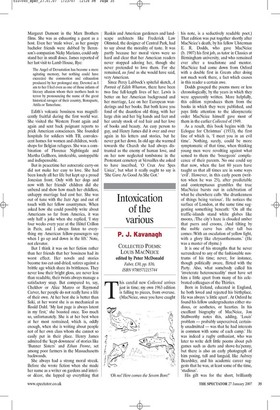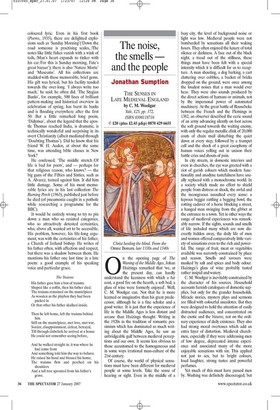Intoxication of the various
P. J. Kavanagh COLLECTED POEMS: LOUIS MACNEICE edited by Peter McDonald Faber, £30, pp. 836, ISBN 9780571215744 This careful new Collected arrives just in time; my own 1963 edition is falling to pieces, from overuse. (MacNeice, once you have caught his note, is a seductively readable poet.) That edition was put together shortly after MacNeice's death, by his fellow Ulsterman E. R. Dodds, who gave MacNeice (b. 1907) his first job, as tutor in Classics at Birmingham university, and who remained ever after a touchstone and mentor. MacNeice had come down from Oxford with a double first in Greats after doing not much work there, a fact which causes in this reader a certain awe.
Dodds grouped the poems more or less chronologically, by the years in which they were apparently written. More helpfully, this edition reproduces them from the books in which they were published, and pays little attention to the idiosyncratic order MacNeice himself gave most of them in the earlier Collected of 1949.
As a result, this book begins with 'An Eclogue for Christmas' (1933), the first line of which is, 'I meet you in an evil time'. Nothing, surely, could be more symptomatic of that time, when thinking young men were revolting against what semed to them the 'bourgeois' complacence of their parents. No one could say that now, when the last 80 years have taught us that all times are in some ways 'evil'. However, in this early poem (written when he was 25), after predictable and contemptuous grumbles the true MacNeice bursts out in celebration of what he elsewhere calls 'the drunkenness of things being various'. He notices the surface of London, at the same time suggesting something beneath: 'On all the traffic-islands stand white globes like moons, /The city's haze is clouded amber that purrs and croons, /And tilting by the noble curve bus after tall bus comes /With an osculation of yellow light, with a glory like chrysanthemums.' (He was a master of rhyme.) It is one of his strengths that he never surrendered to any of the fashionable nostrums of his time; never, for instance, though politically aware, flirted with the Party. Also, what somebody called his 'inveterate heterosexuality' must have set him a little apart from many of his celebrated colleagues of the Thirties.
Born in Ireland, educated in England, he both loved and rejected his birthplace. He was always 'a little apart'. At Oxford he found his fellow undergraduates either studious, or aesthetes, or hearties. In his excellent biography of MacNeice, Jon Stallworthy notes this, adding, 'Louis' problem — probably unperceived, certainly unadmitted — was that he had interests in common with some of each camp.' He was indeed a rugby enthusiast, who was later to write deft little poems about pub games such as darts and shove-ha'penny, but there is also an early photograph of him posing, tall and languid, like Aubrey Beardsley, and his academic career suggests that he was, at least some of the time, 'studious'.
His gift was for the short, brilliantly coloured lyric. Even in his first book (Poems, 1935), there are delighted explosions such as 'Sunday Morning'(`Down the road someone is practising scales, /The notes like little fishes vanish with a wink of tails, /Man's heart expands to tinker with his car /For this is Sunday morning, Fate's great bazaar'); there is also 'Nature Morte' and 'Museums'. All his collections are studded with these memorable, brief gems. His gift was lyrical, but his facility tended towards the over-long. 'I always write too much,' he said; he often did. 'The Stygian Banks', for example, 500 lines of brilliant pattern-making and historical overview in celebration of spring, has burst its banks and is flooding everywhere after the first 50. But a little remarked long poem, `Didymus', about the legend that the apostle Thomas reached India, is dramatic, is technically wonderful and surprising in its overt Christianity (albeit mediated through 'Doubting Thomas'). Did he know that his friend W. H. Auden, at about the same time, was attending bible classes in New York?
He confessed, 'The middle stretch /Of life is bad for poets', and — perhaps for that religious reason, who knows? — the big guns of the Fifties and Sixties, such as A. Alvarez, turned against him It did him little damage. Some of his most memorable lyrics are in his last collection The Burning Perch (1963), published just before he died (of pneumonia caught in a pothole while researching a programme for the BBC).
It would be entirely wrong to try to pin down a man who so resisted categories, who so attractively detested certainties, who, above all, wanted art to be accessible. His problem, however, his life-long argument, was with the certainties of his father, a Church of Ireland bishop. He writes of his father often, with affection and respect, but there was a shadow between them. He mentions his father one last time in a late poem: a good example of his speaking voice and particular grace.
The Truisms His father gave him a box of truisms Shaped like a coffin, then his father died; The truisms remained on the mantelpiece As wooden as the playbox they had been packed in Or that other his father skulked inside.
Then he left home, left the truisms behind him Still on the mantelpiece, met love, met war, Sordor, disappointment, defeat, betrayal, Till through disbeliefs he arrived at a house He could not remember seeing before, And he walked straight in; it was where he had come from And something told him the way to behave. He raised his hand and blessed his home; The truisms flew and perched on his shoulders And a tall tree sprouted from his father's grave.















































 Previous page
Previous page